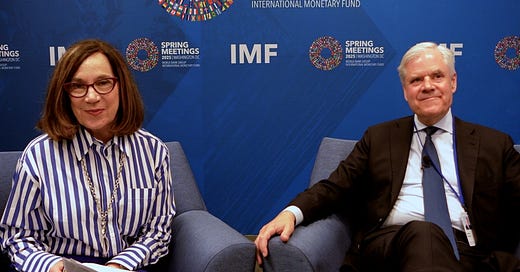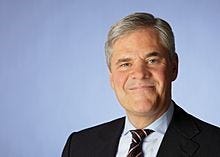Andreas Dombret is living proof to me of the expression, “Once a central banker, always a central banker.” He started his career as a private banker, and it was not long before he was drawn into the policymaker role when he became deputy governor of the German central bank, the Bundesbank. It, of course, became not just part of the ECB, but the institution the ECB and its charter were modeled after. Andreas was a founding member of the Supervisory Board of the European Central Bank. And then later was on the board of the Bank for International Settlements (BIS).
He has “been there, done that” not only as a European central banker but also as an international consultant and advisor to firms, institutions, and governments around the world. He not only knows monetary economics but also political economy, the two of which must be combinedto understand and analyze the forces that are in play in policy circles today.
So who better to sit down at the Spring Meetings of the International Monetary Fund and World Bank to discuss Trump tariffs and what their impact will be on the European and global economies?
In addition, Germany's taking the lead in Europe, and putting its foot on the pedal for defense spending will not only boost security, it also will help lift the world’s third-largest economy out of its recessionary malaise. If the euro is on the verge of challenging the dollar as the world’s reserve currency, this is where it will start.
On this last one, spoiler alert: Andreas says, “Of course not.” Want to know why? Then dive in and hear what he has to say. You will get a fascinating crash course in the pragmatic principles of international finance from someone who has played the game on both sides of the table.
IMF WEO forecast of a minor slowdown in global growth 00:01:33:23
It's very difficult to do projections ina year like this where you actually don't know where the tariffs will end. The way I understand the tariffs Ois that they are ceilings and the outcome could be well within those, you know, below those ceilings. And this is with the barriers the President is putting forward. But if you read through the text of the World Economic Outlook, it is assuming a much more unfavorable growth environment than actually is in the numbers. The numbers are a lot better than the text. And whilst the IMF may just be true in its projections for my personal point of view, I have a more negative view about global growth.
ECB is still true to its data dependency 00:04:14:07
You know, it's very difficult to say and hard to assess. And the same, of course, holds true for the ECB. The ECB is consistent, though, in being data dependent. And it was clear that, you know, last Thursday, the monetary policy decision of the ECB, they did what they had announced they would be doing and they were very much aligned within the Governing Council in doing so.
The end of synchronization 00:04:41:09
Now, going forward, it's not so clear whether we're going to see more cuts. We had six quarter-of-a-percentage-point cuts in a row in Europe. Now, it's not that clear how this will continue going forward. But you know, what is more interesting to me is that in the meantime, the economy in the United States and the economy in Europe is no longer as aligned as they were in the past
Euro fiscal-miliary spending to rise...so? - 00:06:12:11
In another 500 billion over 12 years for infrastructure spending in Germany alone means that most of that is not going to really be invested in the German economy. So because they are not that many German producers of military there, some European and of course a lot of American producers of military. But then you have a 100 billion package in the infrastructure package, which is earmarked for green for the green economy. That is a replacement. So it's, you know, this investment in, let's say, energy, a new energy is replacing other existing energy sources. So of these that's a €1 trillion of investment, whether it be military or infrastructure. Over the next year, maybe €200 or €300 billion will only actually reach German economy. Okay. With efficiency gains, etc., etc.. So net-net it's not necessarily all inflationary. Last time I checked military spending is not in the in the in the German basket and it wouldn't be so. So you know, I wouldn't think of inflation as it's the first most critical aspect to that. How about growth though. I think that Germany, which is predicted in the World Economic Outlook, was 0% growth for this year it is being underestimated very much like in tariffs where you have the tariffs themselves or the announcement of those. But you also have the unpredictability and, you know, market participants becoming insecure about this. You can, I think, expect that if there is powerful investment in infrastructure and military in Germany, the mood in the German economy will lighten up and Germany will get back on track sooner than the IMF has projected.
Nixon moment? A return to bilateralism? 00:09:13:15
It is potentially one of those moments and many, many, many banks across the world, they're sitting in the risk committees thinking whether or not this could be another Nixon moment. And I think it could well be. What does that mean for us? What does that mean for the world? It means that we're going to readjust and that we have a new system. You know, we used to have a multilateral system, a globalized system, and now we are getting not fully away from multilateralism, but bilateralism is becoming more and more important. And that is changing the framework. And we have to see how this how this will play out. Why is why is it. Why is the becoming more important to have the bilateral wisdom?
A Trump tariff lament 00:11:55:13
There are countries in the world who overproduce and then dump those overproduction in the global markets. And China is a good example of of that and that you are thinking and even imposing tariffs on China for example, I can understand because it's not always a fair trade. And that's why we did have the World Trade Organization, etc., etc.. So in an ideal world you don't want to have any tariffs, but if you want to penalize China, why do you penalize everybody, including your allies? That I find hard to understand. And I think that is not going to work out. And the markets are taking a beating.
Dollar is still king but under siege 00:13:56:19
And you can clearly see that the treasuries are no longer as much in favor as they were in the past. And that, I think, did make President Trump reverse his course for good reason. Is the euro as the second most important reserve currency of the world, going to challenge the dollar overnight? Of course not. 90% of all swap transactions have the dollar on one side. So you see a lot of dollar involvement wherever you go. And you cannot take that away. And the dollar, of course, is still a safe asset. But, you know, there are plenty of, let's say, German boots out there. There are plenty of European public debt out there. And over time, the role of a reserve currency must be wanted by must be wanted by the administration.
Andreas Raymond Dombret is German-American banker who served as member of the executive board of Deutsche Bundesbank from 2010 until 2018. In that capacity, he held responsibility for Banking and Financial Supervision, Financial Stability, Markets, Risk Controlling, Statistics, Economic Education and the Bundesbank’s representatives abroad. From 2014 until 2018 Andreas served as a founding member of the Supervisory Board of the European Central Bank, and from 2012 until 2018 on the Board of the Bank for International Settlements. During his term, Andreas acted as the Bundesbank deputy at the IMF, the OECD, the G7 and the G20 and represented the German central bank on the Basel Committee.
Earlier in his career, Andreas was Vice Chairman of Bank of America Global Investment Banking in Europe, the Middle East and Africa. Prior to this, he served as co-head of Rothschild Germany after having spent 10 years as Managing Director with JP Morgan in London and Frankfurt. Andreas started his career at Deutsche Bank headquarters.
After retiring from public office, Andreas Dombret continued to serve on the board of Basel-based Bank for International Settlements until the end of 2018 and subsequently assumed a portfolio of advisory mandates at various firms including Oliver Wyman, Santander, Sumitomo Mitsui Bank and Houlihan Lokey, the US investment bank. Andreas teaches at Columbia University in New York City as well as at the European Business School in Wiesbaden while serving on the Board of the European School for Management and Technology in Berlin. He holds dual German and American citizenships.














Share this post